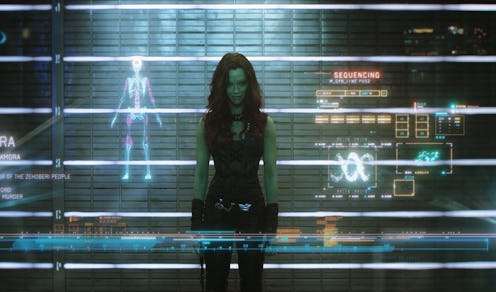Entertainment
Guess Who's Taking Over Sci-Fi? (Spoiler: Women)

The science fiction genre has an irrefutable history of excluding women. Remember that Fake Geek Girls movement in which female sci-fi fans were accused of lying about their tastes to impress men? Yeah — unfortunately I do, too. It bummed me out because its proponents reduced my interests to a shallow attempt to get a boyfriend, not a passion I had been cultivating my entire life. So, when I decided to look into where women writers stood in the sci-fi genre now, I didn’t expect to find much.
Enter Nicole Perlman. She's the co-author of Guardians of the Galaxy , which makes her the first woman to write a screenplay for Marvel Comics. She brought the equally tough and feminine Gamora to life (that's her above!), and geek girls everywhere rejoiced. A female protagonist was successful in a main stream sci-fi movie! Her author is a woman!
There's more: sci-fi author Diana Gabaldon's time-traveling epic Outlander was recently adapted into a television show, which premiered on Starz in August. Women are not only proving their stead, but becoming the breakout hit-makers of the sci-fi genre.
Even though Gabaldon and Perlman prove beyond any doubt that women enjoy sci-fi — we read it, we watch it, we want to be a part of the movement — I still wasn’t convinced that women writers were dominating the genre. Then I took a look at the Amazon sci-fi best-sellers. On the first page of the Amazon list alone, there are six female writers. I decided, then, to see what was happening in best-sellers at large, so I looked at the New York Times best-seller list. Of the 15 books listed, four are sci-fi — but guess who's at No. 1 overall? Diana Gabaldon for Outlander.
I didn’t think I would find more than two women on either list because the entertainment industry has played a nasty trick on us girls, one that even I bought into: I thought there weren’t enough women interested in sci-fi. I thought we had more territory to conquer. Networks keep up the lie when they don’t hire female writers on their sci-fi TV shows: Doctor Who has not featured an episode written by a woman since 2008. Season 5 of Game of Thrones will also return with zero female writers. Not one.
A quick refresher: Two of the biggest recent sci-fi and fantasy franchises in entertainment were based on books written by women: The Hunger Games and Divergent. Both feature central female protagonists in military-like roles, and they are both cultural phenomena of the highest order — no tough-guy male lead needed, thank you very much. So, on the television side, excluding women from the writers' room seems nonsensical: Doctor Who and Game of Thrones have a history of featuring some of the strongest and most beloved women on television. Sure, we love Daenerys Targaryen and Clara Oswald now, but imagine if a woman had a crack at developing their characters. The possibilities for their expansion are endless.
Now that Perlman has written a screenplay for Marvel, women have solidified their place as formidable writers in the genre. And yet, Gamora was recently excluded from a kids' Guardian's of the Galaxy T-shirt. It seems like a small transgression, but it speaks volumes: it reminds girls that we don't belong.
Except that we do. We've been sci-fi's up-and-coming stars for years now. And whatever force is trying to convince us that we don’t belong here is failing. As long as the industry continues to pretend women don't exist, we’ll just keep writing blockbuster movies and bestselling books. Networks that don’t hire female writers for their sci-fi shows are only hurting themselves. They risk falling behind the growing movement that doesn’t buy the lie that women aren’t sci-fi’s target audience.
In reality, women have conquered sci-fi already. Sure, some people prefer to keep things a boys' club, but let's get real. The new female Thor makes her debut in October. Jennifer Lee is adapting Madeleine L'Engle’s a Wrinkle in Time for the screen. It’s only up from here, ladies.
I couldn’t be happier that I was wrong.
Image: Marvel; BBC; Lionsgate